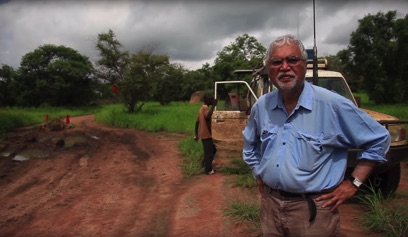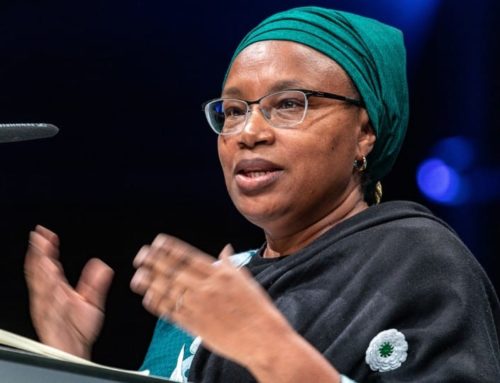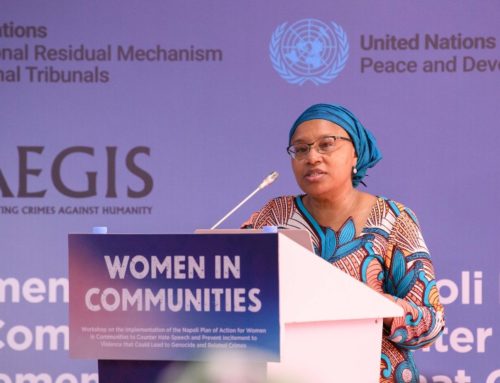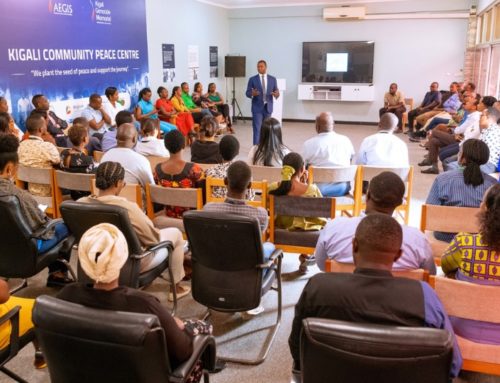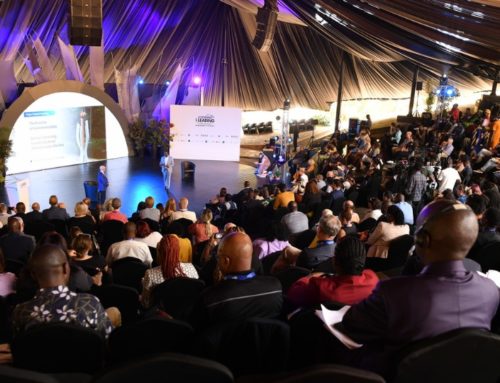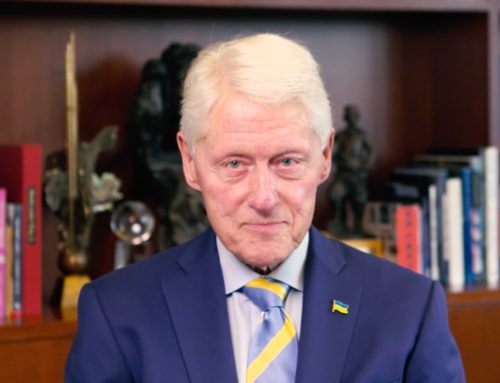Back from his latest visit to Sudan’s Nuba Mountains, where he encountered impassable roads planted with anti-tank mines and witnessed the terrifying effects of a Government air attack on Farandalla Hospital, Dr Mukesh Kapila – the Aegis Trust’s Special Representative on Crimes Against Humanity – says that although deeply disturbed by what he witnessed, he’s also been greatly inspired by the resilience of the Nuban people.
In a compelling 11-minute film about the visit (Sudan 2014: Resisting Evil), Dr Kapila takes viewers on the journey with him from Yida refugee camp in South Sudan to Farandalla Hospital in the Nuba Mountains.
In Yida, we meet with him some of the survivors of recent air attacks who have lost loved ones and suffered horrendous injuries – ranging from severe burns to blindness – as a result of the Sudanese Government’s bombing campaign.
Some of the refugees complain about the lack of aid assistance in Yida; particularly the lack of educational provision. There is a small school, but it cannot meet the whole camp’s needs. “When the children don’t get clothes, food and education, they end up stealing in the market,” one of the sheikhs tells Mukesh. “Whenever we request a school here, the UN tell us to go to Ajuong Thok.”
Ajuong Thok is a smaller refugee camp approximately 50km southeast of Yida by road, inside South Sudan but still close to the border with Sudan. The option of being relocated there is rejected by some refugees who feel they are safer at Yida with the buffer of a strong SPLM-North presence on the north side of the border between them and Government ground forces.
Some also dislike the idea of being forced to move on again after having struggled to establish some basic infrastructure in Yida, where they also feel closer to home. “If there was peace in the Nuba Mountains, we could go back to Sudan,” another community leader tells Mukesh. “We would be happy to go back. We wouldn’t even wait two days.”
Since Mukesh was travelling in the rainy season, the journey from Yida north to Farandalla took four times longer than normal. It was interrupted by flooding, some dramatic potholes, and even anti-tank landmines barring the way at one point (pictured).
Local staff at Farandalla explain how the community in the area set up the facility to help themselves, in lieu of any help from the Government. From the start of the war in the Nuba Mountains in 2011, they were without medicines until the arrival of MSF, who have enabled them to better serve the local population.
Patients experience a wide range of problems, many exacerbated – if not directly caused – by the war and the Sudanese Government’s assault on the region’s civilian population.
Eyewitnesses gave Mukesh an account of the terrifying Government air attack on Farandalla on 16 June. One young mother living near the hospital rushed there with her baby, after the child was injured by shrapnel from a bomb landing near their house. No sooner did they reach the hospital than that site was bombed too.
Staff showed Mukesh where four bombs struck the hospital compound and its immediate vicinity. Several people were injured, and one patient died as a result of the attack. “The Government knows this is a hospital, a place for treating sick people,” one of the staff tells Mukesh. “It has targeted every such place.”
Farandalla was the fourth medical facility bombed in the Nuba Mountains in 2014. Two days after Mukesh visited, more bombs were dropped just outside the hospital.
“The Nuba Mountains today appear to have been forgotten,” says Mukesh Kapila. “There are no quick fixes to this crisis. In my view we need three things; firstly, a comprehensive approach that connects all the problems of the Sudan region together and addresses them simultaneously. Second, efforts to help the Sudanese people build their own capacity and resilience to continue their struggle against injustice and genocide, and thirdly, redouble our efforts to get accountability through international processes such as the International Criminal Court.”
Reflecting on overall impressions from this third visit in the past three years, Dr Kapila concludes: “I came away from the Nuba Mountains disturbed but strangely inspired. The message from the Nuba people to their brothers and sisters across Sudan, and across the border in South Sudan, is that through stubborn resistance and strengthening their own capacity, they can not only hold on and resist evil, but ultimately earn a better destiny.”
To watch the film of Mukesh Kapila’s 2014 visit to the Nuba Mountains, click here. Dr Kapila’s visits in 2013 and 2012 were also captured on film. You can see them here: Sudan’s Forgotten Warzones (2013) and Nuba 2012: return to genocide? (2012).
Dr Kapila’s 2014 visit was filmed by Tim Freccia with assistance from Peter Moszynski. It was made possible by the Aegis Trust; People4Sudan; the African Freedom Coalition; the Darfur Relief and Documentation Centre; Jewish World Watch; Nuba Relief, Rehabilitation and Development Organisation; Saxe Gothe Presbyterian Church; Sudan Relief and Rehabilitation Association; USC Shoah Foundation and Waging Peace.

